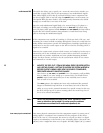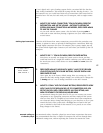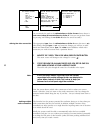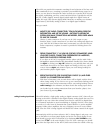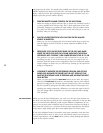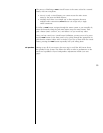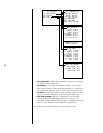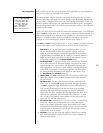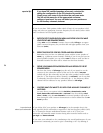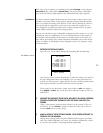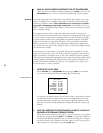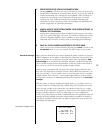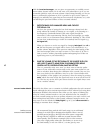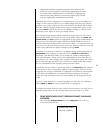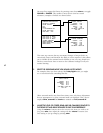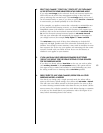
56
special tip: If you have THX-certified speakers all around, a shortcut for
setting the configuration to the THX standard is provided.
Simply move your cursor to the bottom line and press enter.
This will set the menus for all the appropriate crossover
settings at one touch. You may still select your own preference
for the Auxiliary channels, however.
If you do not have THX speakers, define which (if any) of your speakers is full
range, and select an appropriate crossover frequency for the others, below which
bass is redirected to bass-capable speakers.
1 ENTER THE SET CONFIGURATION MENU AND DEFINE HOW YOU WANT
YOUR FRONT L&R SPEAKERS TREATED
Using enter and the volume ± buttons, choose either full rng or an appro-
priate crossover frequency for your front left and right speakers. Save your
selection (enter).
2 REPEAT THIS PROCESS FOR THE CENTER AND REAR SPEAKERS
Remember that you have an additional option with the center speaker of
none (e.g., a phantom center channel). Similarly, if you do not yet have sur-
round speakers installed, you can select none for them as well, and the in-
formation intended for them will be mixed into the front channels.
3 DEFINE YOUR SUBWOOFER APPROPRIATELY AND RETURN TO THE SET
SPEAKERS MENU
You have the choice of full range (use this only if you intend to use the
crossover in the subwoofer instead of the one in the AVP2); low pass
(which will give the subwoofer any bass the other speakers cannot handle,
plus the “.1” low frequency effects channel); or not used if you do not have
a subwoofer. Note that without a subwoofer, the “.1” low frequency effects
channel will be redirected to any speakers defined as full range.
4 CHOOSE WHAT YOU WANT TO DO WITH YOUR AUXILIARY CHANNELS, IF
ANYTHING
As notes above, your options include dual drive, stereo backs, center
back, stereo subs
, extra mono sub or not used. Note that whether dual
drive
or sides, using the aux channels for surround speakers will result in
them having the same crossover characteristics as those defined for the sur-
round
speakers.
important note
about your subwoofer:
If you define all of your speakers as full range (as in the example above), the
only signal left for the subwoofer to reproduce is the low frequency effects (LFE)
or “.1” channel in discrete multichannel formats such as AC-3. Thus your
subwoofer will normally remain inactive during other surround modes such as
pro logic and stereo surround.
If you want your subwoofer to be contributing to the overall performance of your
system more consistently, you need to give it something to do—by defining at



